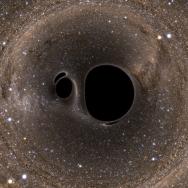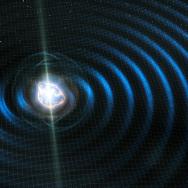In October, LIGO’s discovery of gravitational waves from two colliding black holes won the 2017 Nobel Prize in Physics. But three decades ago, it was a controversial project (even among the scientific community) in search of funding.
Walter Massey, chancellor of the School of the Art Institute of Chicago and senior adviser to the President of the University of Chicago, was director of the National Science Foundation in 1991; he worked to convince the foundation’s science board to endorse the project, and then to convince Congress to fund it.
There were very good reasons why LIGO’s future was uncertain, he said.
“Even though Einstein’s theory of general relativity predicts gravitational waves, they’d never been observed,” said Massey, a former UChicago professor in physics and former director of Argonne National Laboratory. “So you want to build a machine that you don’t know will work, to find something that may or may not exist.”
Among the other hurdles, Massey said: LIGO would have been the largest project the NSF had ever funded, and many scientists, especially astronomers, opposed it on grounds that the funding would be better spent on telescopes or other less risky projects already proven to work.
Massey and his colleagues succeeded in securing Congressional support, and the rest is history. On Feb. 11, 2016, the LIGO collaboration announced it had detected the gravitational waves from two black holes merging. And earlier this year, they heard the waves from the collision of two neutron stars, which allowed them to pinpoint the location with telescopes—opening a truly new era of astronomy. UChicago scientists participated in both discoveries.
This week, in gratitude for his role in LIGO, Massey will attend the ceremony for the Nobel Prize as the guest of newly minted laureate Kip Thorne.
“It’s been a gratifying couple of years for me, to see something from so far in my past to come about and bear such tremendous fruit,” he said. “It’s wonderful to have been a part of it.”

